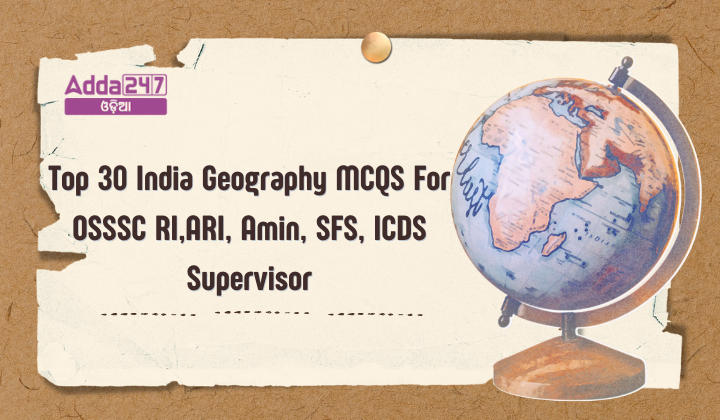Preparing for competitive exams such as OSSSC RI (Revenue Inspector), ARI (Assistant Revenue Inspector), Amin, SFS, or ICDS Supervisor often requires a strong grasp of historical events. Modern history, especially, forms a significant part of the syllabus, covering crucial periods and events that shaped the world as we know it today. To aid in your preparation, here are 30 multiple-choice questions (MCQs) focusing on modern history:
Top 30 Geography MCQS For OSSSC RI,ARI, Amin, SFS, ICDS Supervisor 09 August 2024
- What does salinity in ocean water refer to?
(a) The total content of dissolved salts in the sea or ocean
(b) The temperature of ocean water
(c) The density of seawater
(d) The volume of water in the ocean
Ans: (a) The total content of dissolved salts in the sea or ocean - How is salinity generally expressed?
(a) Parts per million (ppm)
(b) Percentage (%)
(c) Parts per thousand (ppt)
(d) Grams per liter (g/L)
Ans: (c) Parts per thousand (ppt) - What is considered the upper limit of salinity for water to be classified as ‘brackish’?
(a) 24.7 ppt
(b) 24.7 %
(c) 30.0 ppt
(d) 35.0 ppt
Ans: (b) 24.7 % - Which of the following factors does NOT influence ocean surface salinity?
(a) Evaporation
(b) River inflow
(c) Earthquake
(d) Precipitation
Ans: (c) Earthquake - In polar regions, what process significantly influences surface salinity?
(a) Ocean currents
(b) Evaporation
(c) Freezing and melting of ice
(d) Wind patterns
Ans: (c) Freezing and melting of ice - Which water body has the highest salinity among the following?
(a) Dead Sea
(b) Lake Van
(c) Great Salt Lake
(d) Pacific Ocean
Ans: (b) Lake Van in Turkey - Which of the following is the most abundant salt in seawater?
(a) Magnesium chloride
(b) Sodium chloride
(c) Potassium sulphate
(d) Calcium sulphate
Ans: (b) Sodium chloride - What percentage of the dissolved salts in seawater is Sodium Chloride?
(a) 77.7%
(b) 10.9%
(c) 4.7%
(d) 2.5%
Ans: (a) 77.7% - Which salt contributes 10.9% of the total dissolved salts in seawater?
(a) Magnesium chloride
(b) Potassium sulphate
(c) Magnesium sulphate
(d) Calcium sulphate
Ans: (a) Magnesium chloride - Which factor does NOT directly affect the salinity of ocean water?
(a) Wind patterns
(b) Ocean currents
(c) Amount of dissolved oxygen
(d) Precipitation
Ans: (c) Amount of dissolved oxygen - Which of the following rock types is considered the primary rock in the rock cycle?
(a) Sedimentary
(b) Metamorphic
(c) Igneous
(d) Magma
Ans: (c) Igneous - What is the primary process by which sedimentary rocks form?
(a) Crystallization
(b) Erosion and sedimentation
(c) Metamorphism
(d) Melting
Ans: (b) Erosion and sedimentation - Through which process can metamorphic rocks turn into igneous rocks?
(a) Subduction
(b) Erosion
(c) Crystallization
(d) Metamorphism
Ans: (a) Subduction - Which of the following processes is not directly involved in the rock cycle?
(a) Plate tectonics
(b) Photosynthesis
(c) Erosion
(d) Crystallization
Ans: (b) Photosynthesis - The process by which old rocks are transformed into new ones is known as:
(a) Sedimentation
(b) The rock cycle
(c) Metamorphism
(d) Crystallization
Ans: (b) The rock cycle - Which type of rock forms when magma cools and solidifies?
(a) Sedimentary
(b) Metamorphic
(c) Igneous
(d) Lava
Ans: (c) Igneous - In which zone of plate tectonics do rocks often melt to form magma?
(a) Subduction zones
(b) Mid-ocean ridges
(c) Continental shelves
(d) River valleys
Ans: (a) Subduction zones - Which process involves the breaking down of rocks into smaller pieces?
(a) Metamorphism
(b) Crystallization
(c) Erosion
(d) Subduction
Ans: (c) Erosion - What drives the rock cycle by moving Earth’s plates?
(a) Ocean currents
(b) Gravity
(c) Plate tectonics
(d) Wind
Ans: (c) Plate tectonics - Metamorphism primarily occurs due to:
(a) High pressure and temperature
(b) Erosion
(c) Crystallization
(d) Subduction
Ans: (a) High pressure and temperature - Which of the following forces is NOT involved in physical or mechanical weathering?
(a) Gravitational forces
(b) Expansion forces
(c) Chemical reactions
(d) Water pressures
Ans: (c) Chemical reactions - What is the primary cause of fractures occurring parallel to the ground surface during physical weathering?
(a) Frost wedging
(b) Thermal expansion
(c) Pressure release due to unloading
(d) Salt crystallization
Ans: (c) Pressure release due to unloading - In which climate is diurnal temperature variation most effective in causing physical weathering?
(a) Humid tropical climates
(b) Arid climates
(c) Polar climates
(d) Subtropical climates
Ans: (b) Arid climates - The process of frost wedging is most effective in which of the following regions?
(a) Equatorial regions
(b) Glacial regions
(c) Desert regions
(d) Coastal regions
Ans: (b) Glacial regions - Which type of weathering is associated with the formation of exfoliation domes?
(a) Chemical weathering
(b) Biological weathering
(c) Salt weathering
(d) Unloading and expansion
Ans: (d) Unloading and expansion - What triggers the expansion of minerals within rocks due to temperature changes?
(a) Chemical reactions between minerals
(b) Growth of plant roots
(c) Repeated cycles of heating and cooling
(d) Constant high temperatures
Ans: (c) Repeated cycles of heating and cooling - Which of the following processes is most responsible for granular disintegration in rocks?
(a) Pressure release
(b) Frost wedging
(c) Salt crystallization
(d) Biological activity
Ans: (c) Salt crystallization - What is the key factor that influences the effectiveness of salt crystallization in weathering?
(a) High altitude
(b) Temperature range
(c) Soil moisture content
(d) Mineral composition of the rock
Ans: (b) Temperature range - In what type of rock does frost wedging most frequently occur?
(a) Igneous rocks
(b) Sedimentary rocks
(c) Metamorphic rocks
(d) All of the above
Ans: (d) All of the above - Which of the following best describes the impact of freezing on the weathering process?
(a) Rapid freezing causes contraction and tightens rock fractures
(b) Slow freezing leads to gradual expansion with little effect on rocks
(c) Rapid freezing causes expansion and increases pressure in cracks
(d) Freezing has no significant effect on weathering
Ans: (c) Rapid freezing causes expansion and increases pressure in cracks
















